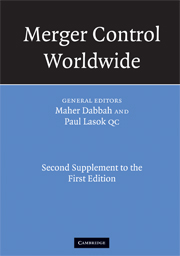Book contents
- Frontmatter
- Contents
- List of contributors
- Table of cases
- Table of legislation
- Introduction to the Second Supplement
- Introduction to the First Supplement
- 1 Argentina
- 2 Armenia
- 3 Australia
- 4 Austria
- 5 Belgium
- 6 Brazil
- 7 Canada
- 8 Chile
- 9 China
- 10 Denmark
- 11 European Union
- 12 Germany
- 13 Greece
- 14 Iceland
- 15 Italy
- 16 Japan
- 17 Republic of Korea
- 18 Malta
- 19 Mexico
- 20 The Netherlands
- 21 New Zealand
- 22 Norway
- 23 Singapore
- 24 Spain
- 25 Switzerland
- 26 Taiwan
- 27 Ukraine
- 28 United Kingdom
- 29 United States of America
- Index
9 - China
Published online by Cambridge University Press: 30 July 2009
- Frontmatter
- Contents
- List of contributors
- Table of cases
- Table of legislation
- Introduction to the Second Supplement
- Introduction to the First Supplement
- 1 Argentina
- 2 Armenia
- 3 Australia
- 4 Austria
- 5 Belgium
- 6 Brazil
- 7 Canada
- 8 Chile
- 9 China
- 10 Denmark
- 11 European Union
- 12 Germany
- 13 Greece
- 14 Iceland
- 15 Italy
- 16 Japan
- 17 Republic of Korea
- 18 Malta
- 19 Mexico
- 20 The Netherlands
- 21 New Zealand
- 22 Norway
- 23 Singapore
- 24 Spain
- 25 Switzerland
- 26 Taiwan
- 27 Ukraine
- 28 United Kingdom
- 29 United States of America
- Index
Summary
As is widely known, China was engaged in the process of adopting a new competition law, the Anti-monopoly Law (the “AML”) for over ten years. Several drafts came to be produced in the process. On 7 June 2006 however, the Central Government of China (known as the State Council) held a discussion on the then latest draft of the AML and a decision was made to approve in principle that draft. On 30 August 2007 a draft dated 24 August 2007 was enacted into law and on that basis the AML was finally adopted.
Considerable importance is being attached in many quarters in China to the AML as a vital tool for the purpose of protecting the process of competition in the country. The general consensus over the desirability of a proper competition law that has been gaining strong grounds over the last few years has revealed considerable doubts over the effectiveness of the various laws and regulations which have been in use (see the Main Chapter). The firm belief held in many quarters is that the AML, when it comes into force, will prove to be particularly effective in building a strong market economy through the eradication of anti-competitive behaviour and abusive conduct as well as through scrutinising what has become a fast-developing process of acquisitions of domestic firms by multinational enterprises which many in China have come to view as a serious development likely to give those multinationals the ability to develop a monopoly position in various domestic sectors.
- Type
- Chapter
- Information
- Merger Control WorldwideSecond Supplement to the First Edition, pp. 34 - 37Publisher: Cambridge University PressPrint publication year: 2008

